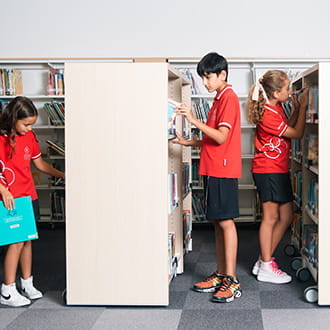We use cookies to improve your online experiences. To learn more and choose your cookies options, please refer to our cookie policy.

The transition from primary to secondary school can be a significant change for your children. It can be quite daunting and many students aren't too sure about what to expect. But with the right support and preparation, it can be a very exciting time. At SISD there is a lot we do to make the change as smooth and enjoyable as possible. That being said, here are things you can do at home to make the transition even easier.
It’s important to acknowledge that some children find it harder to transition to secondary school than others. Indeed, understanding why it’s difficult for some helps to prevent them from struggling on their own with the change.
If they are heading to a new school, some children may be worried about making new friends. Or perhaps they might be worrying about finding their way around the school. In particular, if they aren’t used to having different lessons in different classrooms. This is a very common fear and it’s easy to forget how much change is involved with going into secondary school. You can help your child face these fears by empowering them and boosting their confidence in new places. Furthermore, communicating with them about their feelings and acknowledge that they are valid is essential. And additionally, reminding them that they are not alone in how they feel.
Communicating with your child helps to encourage the exploration of new and existing feelings. Allow time to appreciate their primary school experience. This means to talk about how they feel, what they enjoyed, and what they will miss. If there are friends in their primary school that won’t be joining them for secondary school, you can make plans to see them again. This will show your child it doesn’t mean they have lost their friends. Plus, it will encourage them to make friends in their new school.
Speak to your child about what they are looking forward to in their new school and year group. Try to focus on the positives of the change making it an exciting prospect. Additionally, you can offer them reassurance by talking about your own experience. Showing them that you went through the same thing (and survived!) will make them feel less alone.
Building on your child’s confidence and independence can hugely benefit their transition period. Adding little responsibilities into their routine at home can help buy the independence needed for secondary school. Praising your children for taking on these new responsibilities can help further build their confidence. If you see them struggling, offer them additional support and show them that it's okay to wobble. Explain that you will be there to support them if they do.
Making sure you have everything ready for the start of school means there’s less chance of forgetting something important. A week before school, make sure your child has packed or made a list of everything they need for their first day.
Plan the route to school in advance. If your child is taking the bus, make sure you have the correct bus stop or, if your child is walking, make sure the route is planned. As well as planning your route, plan out what times you need to leave the house and be at school, ensuring you are not late for the first day.
If your child is boarding, allow communication with the boarding staff to familiarise yourself with the school routine and what is expected of the boarding students.
Make sure you have decided whether your child is taking in packed lunches or having school meals that are provided by Swiss Canonica. If they are taking food in, plan and prep this for a week in advance so you don’t have a last-minute struggle the night before.
At SISD we want your child’s experience transitioning into secondary school to be a fun, exciting experience so we give as much support as possible. We aim to build on the skills learnt in the primary year’s program, and prepare them for the challenges in grades 11 and 12 as they move onto pathways such as the IBCP or IBDP. We look forward to welcoming your children to our secondary school!